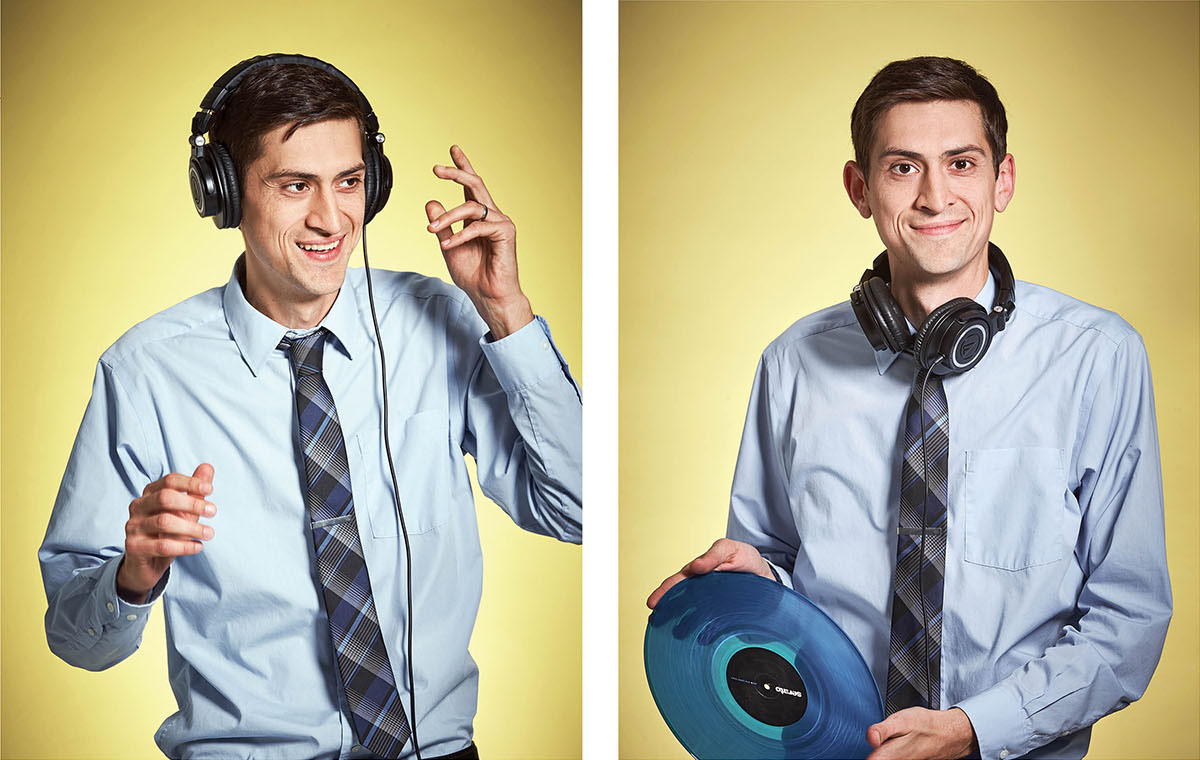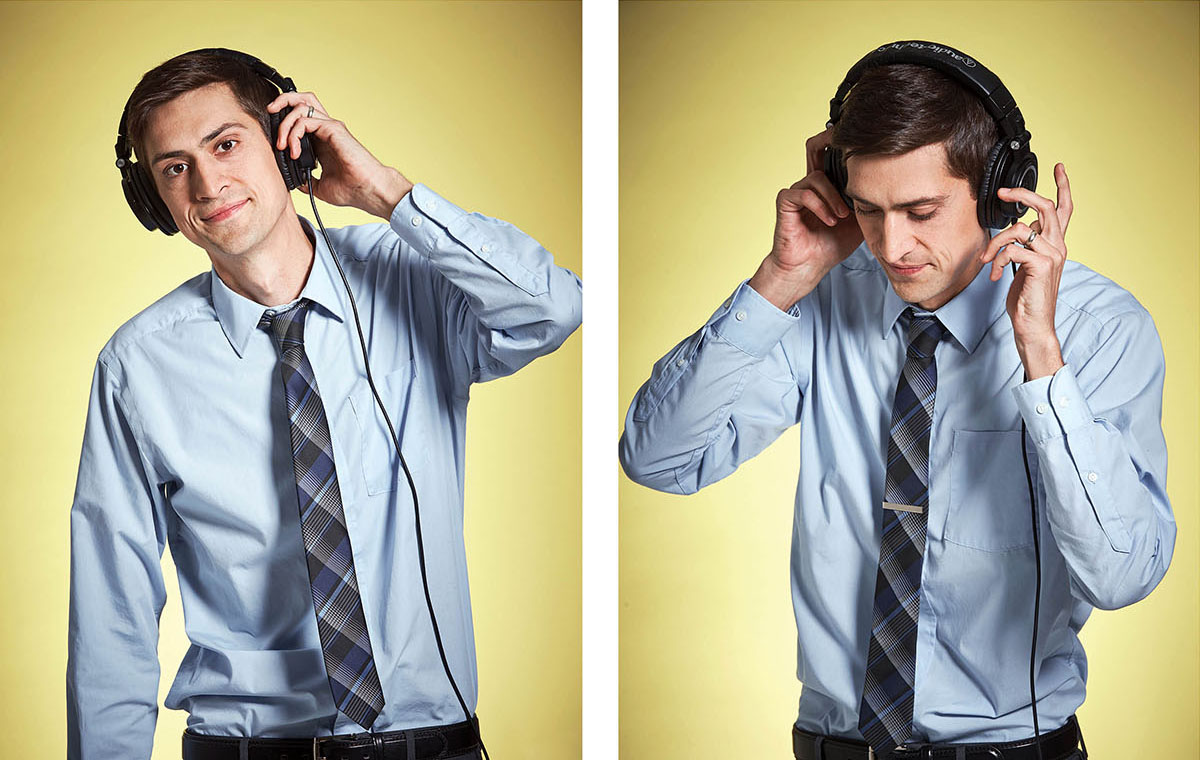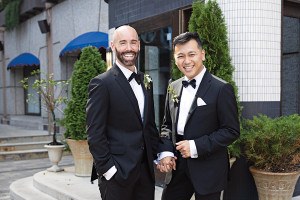The Mix Master: Greg Lanzillotta of Beat Train Productions

Photographs by David Salafia / Hair and makeup by Paula Voisembert/Team
Greg Lanzillotta plays the guitar, drums, bass, and even a bit of piano. But on the weekends, Technics 1200 turntables are his instruments of choice, as he lays the beats at weddings across Massachusetts. “If you have a music background, it’s kind of easy to transition into DJing,” says Lanzillotta, who studied audio production in college and worked as an audio engineer while touring with the likes of REO Speedwagon, Eddie Money, and Good Charlotte. Ahead, Lanzillotta talks do-not-play lists, proper dinner music, and getting guests to actually pay attention during the toasts and announcements.
Why choose a DJ over a band?
Bands are a lot of fun, and people love seeing live music. But the main advantage to a DJ is having more control. Let’s say you have a wedding band and whatever song they happen to play next doesn’t resonate and clears the dance floor. They’re kind of stuck in that song, whereas I can quickly mix out of it. Besides that, we’re generally cheaper than a band. There are more people in a band, so you have to pay for more bodies. Sound is another thing. Bands can be really, really loud, maybe louder than your venue allows you to be.
What qualities make for a good DJ?
The music isn’t really all that important, to be honest with you. A DJ should be passionate and knowledgeable about music, a clear communicator, humble, and willing to work with other vendors. They should also be able to read a crowd. Personally, I try to go above and beyond for my couples and end up doing a lot of things behind the scenes to make their day run as smoothly as possible.
Should a couple share a play list with their DJ or is it better to be spontaneous?
It’s definitely a mix of the two. There’s a planning document I give couples that orchestrates the song choices and formalities throughout the day. That’s my indication of what they like and want to hear. There will be a section on the worksheet that talks about dance music, must-play songs, as well as a section for do-not-play songs. From there, once they’re actually dancing and I can see how guests are responding to what I’m playing, that guides me to what’s going to work best for the night.

Weddings are unique in that there are many generations coming together to celebrate. How does that translate to the songs you choose?
If you have a good crowd that wants to have fun and dance, you can really play anything and they’ll stay out there for you. But typically, if it’s a mix of younger guests and older relatives, I like to jump from genre to genre—for example, from a current pop song to ’70s disco—and sort of blend them together. I don’t want to stay in a pocket of music for too long.
Can you handle the ceremony as well?
Any sort of sound or audio need is something that I can do. That can take the form of a simple ceremony setup with music and a microphone for the officiant. Or a lot of times couples will want their good friend to perform the ceremony music, and they generally aren’t able to provide their own equipment because they’re guests at the wedding. In times like that I’ll provide extra microphones and hook them up through the PA.
What trends are you seeing in wedding music right now?
Most people nowadays don’t want anything to do with line dances, because they’re pretty high school dance-y. Mainly the big hits each summer tend to pop up over and over again. The song “Shut Up and Dance” is still on request lists everywhere. But I really encourage people to pick music that’s personal for them and not conform to any wedding standards.
Is there a certain flow of events you suggest for the party?
After the ceremony and the cocktail hour, I usually recommend doing introductions straight into the first dance, and then from there welcome toasts, the first course, the rest of the toasts, and dinner. After dinner I suggest couples do the cake-cutting and then their parent dances. From parent dances you can open up the dance floor for the rest of the night. It’s a smooth transition.
What kinds of tunes work best for the dinner hour?
I usually encourage people to pick the music they like, but I generally recommend more easy-listening-type stuff—songs that are mellow and in the background, because dinner is a bit quieter of a time than cocktail hour. You definitely don’t want music that’s aggressive or in your face.
What’s the hardest part about emceeing an event?
The biggest challenge is getting guests to listen. If you have a rowdy bunch of people, they’re probably going to ignore the first announcement you make. A brief pause or moment of silence can be effective before making a second announcement, if needed. But typically emceeing is pretty minimal. We’re not on the microphone trying to pump up guests with nonsense. It’s really casual, reserved, and to the point. We like to let the music speak for itself and not have a flashy DJ persona.
347-568-8987, beattrainproductions.com.
Tips
Greg Lanzillotta shares his four wedding-music commandments.
KNOW YOUR AUDIENCE Sometimes couples will want to stick to very niche music, but it’s important to realize that weddings are comprised of a wide array of people. Recognize that even if you don’t like pop and Top 40, the majority of your guests probably will.
KNOW YOUR VENUE Be sure to check with the site about any noise ordinances or restrictions. That comes up fairly frequently, and sometimes clients don’t know about it.
CONSIDER THE FLOOR PLAN You want the music to be as loud as possible on the dance floor, so if I’m up on a balcony or across the room, the sound just isn’t going to travel down there and sound as good as it should.
LET IT FLOW Don’t have a mini dance set before dinner starts. You’ve been to a wedding like that. Most of the time guests don’t want to dance then. They want to eat, drink, and talk with people. Ultimately it takes time away from the end of the night, when people are in the mood for dancing.
Getting married? Start and end your wedding planning journey with Boston Weddings' guide to the best wedding vendors in the city.


